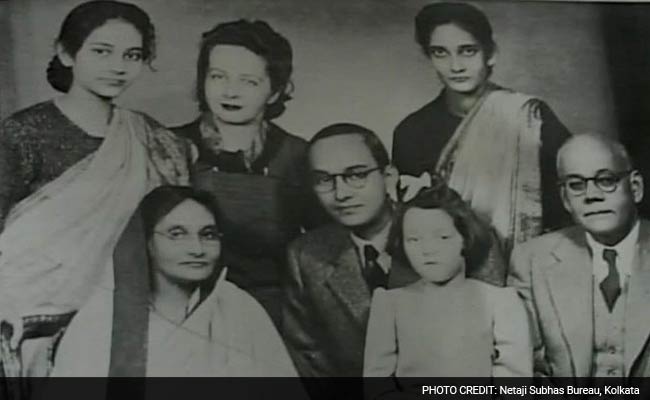The secret police memo of which the bottom left corner is torn
Kolkata:
It's the stuff controversies are born out of. In the Netaji files, made public on Friday, is a secret police memo of May 1946 about a letter that was intercepted. A letter by Netaji's wife Emilie Schenkl from Vienna to Sarat Chandra Bose, Netaji's elder brother. The bottom left corner of the memo is torn. At such a crucial place, you can't but ask, did Netaji's wife believe he died in the air crash of 1945?
The last paragraph of the memo goes, "Emilie Schenkl quite" and then a gap caused by the tear, then the letters "ly believes that Subhas Bose is dead. From the", again a gap, "tone and manner of writing of the letter", a gap again, and then finally, "be genuine."
Mr Rudranshu Mukherjee, historian, author of "Nehru and Bose: Parallel Lives" and vice chancellor, Ashoka University, does not believe the tear is intentional. (Beginner's Guide to the Netaji Mystery: 10 Points)
"That memo actually says, in this letter she declares herself the widow of Subhas Bose and that she is in shock having heard of his death in an air crash. So, yes, that is torn. But it may not have been a deliberate tear but the usual wear and tear of archival documents," says Mr Mukherjee.
"A man disappeared in 1945. As long as he was alive, he never got in touch with his wife and daughter?" asks Mr Mukherjee. "What does it say about his human qualities? Are those claiming he did not die in 1945 willing to face this question? Also, Emilie Schenkl lived well beyon1946 and never publicly said she did not believe Bose had died in the air crash."

Krishna Bose, Netaji kin and head of Netaji Research Bureau, has met Emilie Schenkl. "Aunt Emilie has told us how, while working in her kitchen (in Vienna), suddenly the radio announced that Indian 'quisling' Subhas Chandra Bose died in an air crash. We know that at that moment and later on she did believe it but also hope was always there that something may happen. That hope is normal and natural," said Ms Bose.
A recent book, Her Majesty's Opponent, by Harvard history professor and Netaji's grandnephew Sugata Bose, quotes 1946 correspondence between Ms Schenkl and her friend, an Irish woman, E Woods.
"Mrs Woods had apparently expressed the view that the news of Bose's death might not be true," the book says. Emilie Schenkl's reply: "I am sorry to say I cannot share your hopes. I have somehow the feeling that he has died. If it were not true, nobody should be more glad than myself."
The last paragraph of the memo goes, "Emilie Schenkl quite" and then a gap caused by the tear, then the letters "ly believes that Subhas Bose is dead. From the", again a gap, "tone and manner of writing of the letter", a gap again, and then finally, "be genuine."
Mr Rudranshu Mukherjee, historian, author of "Nehru and Bose: Parallel Lives" and vice chancellor, Ashoka University, does not believe the tear is intentional. (Beginner's Guide to the Netaji Mystery: 10 Points)
"That memo actually says, in this letter she declares herself the widow of Subhas Bose and that she is in shock having heard of his death in an air crash. So, yes, that is torn. But it may not have been a deliberate tear but the usual wear and tear of archival documents," says Mr Mukherjee.
"A man disappeared in 1945. As long as he was alive, he never got in touch with his wife and daughter?" asks Mr Mukherjee. "What does it say about his human qualities? Are those claiming he did not die in 1945 willing to face this question? Also, Emilie Schenkl lived well beyon1946 and never publicly said she did not believe Bose had died in the air crash."

Krishna Bose, Netaji kin and head of Netaji Research Bureau, has met Emilie Schenkl. "Aunt Emilie has told us how, while working in her kitchen (in Vienna), suddenly the radio announced that Indian 'quisling' Subhas Chandra Bose died in an air crash. We know that at that moment and later on she did believe it but also hope was always there that something may happen. That hope is normal and natural," said Ms Bose.
A recent book, Her Majesty's Opponent, by Harvard history professor and Netaji's grandnephew Sugata Bose, quotes 1946 correspondence between Ms Schenkl and her friend, an Irish woman, E Woods.
"Mrs Woods had apparently expressed the view that the news of Bose's death might not be true," the book says. Emilie Schenkl's reply: "I am sorry to say I cannot share your hopes. I have somehow the feeling that he has died. If it were not true, nobody should be more glad than myself."
Track Latest News Live on NDTV.com and get news updates from India and around the world

